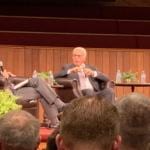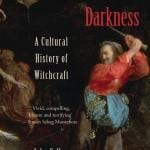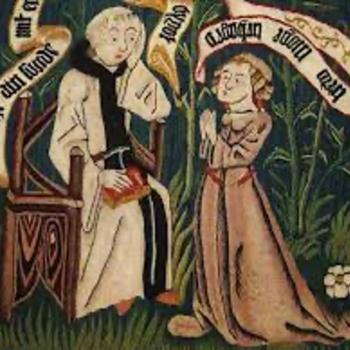If he’s not reading a Harry Potter book, my son is probably enjoying the adventures of another heroic teenager: Percy Jackson, a Manhattan middle schooler who turns out to be a son of Poseidon, the Greek god of the sea. In fact, as his mentor, the centaur Chiron, explains to Percy, the Olympians have relocated to New York City, on the 600th floor of the Empire State Building.
“You mean the Greek gods are here? Like… in America?”
“Well, certainly. The gods move with the heart of the West.”
“The what?”
“Come now, Percy. What you call ‘Western civilization.’ Do you think it’s just an abstract concept? No, it’s a living force. A collective consciousness that has burned bright for thousands of years…. Like it or not… America is now the heart of the flame. It is the great power of the West. And so Olympus is here.”
Now, this idea of a near-eternal West is as unlikely as the rest of author Rick Riordan’s universe. “Wests change,” Philip pointed out this past January. But this idea that Western civilization is both timeless and mobile didn’t start with Percy Jackson.
Indeed, New York City was one of the places where “Western civilization” was constructed. The Upper West Side, to be specific: on the campus of Columbia University.
Not millennia distant, but one hundred years ago this fall.
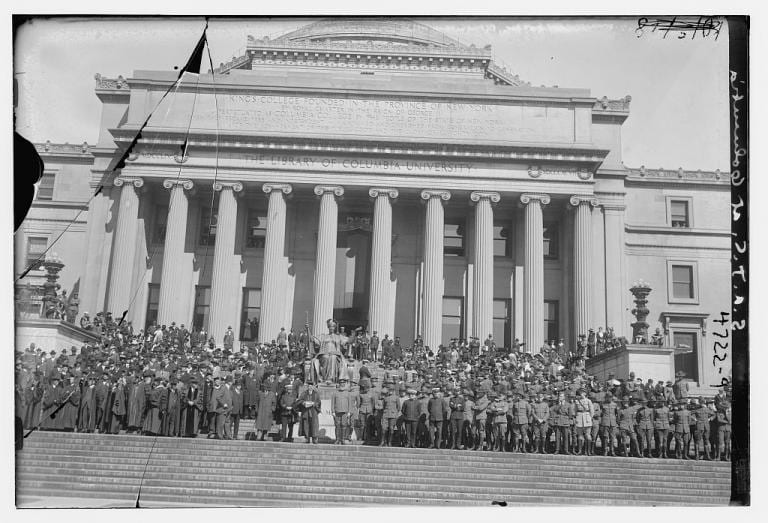
After the United States entered World War I, the federal government asked Columbia College to develop a curriculum that would teach student-soldiers the civilizational stakes of the conflict between the Western powers and Germany. (It wasn’t just that faculty. Carol Gruber’s Mars and Minerva — speaking of ancient gods — documents just how readily historians in those years bought into the war as a defense of the civilized world against “the Hun.”) After the Armistice, Columbia turned that “war issues” course into one on “peace issues.” Introduction to Contemporary Civilization in the West debuted in the fall of 1919: a two-semester course required of new students and taught by historians, philosophers, and social scientists. “I like this course because it is new and my professor is still interested in it,” reported one freshman, “he is not just going over the same old thing again.”
Of course, the course’s designers assumed that the contemporary West had fundamental continuity with the “same old things” from the places where Riordan’s gods have moved over the centuries. So do their 21st century heirs. This year’s students will read Plato, Aristotle, Augustine, Aquinas, Machiavelli, Luther, Descartes, Hobbes, Locke, and Rousseau, among other authors now firmly established as contributors to a Western canon no less controversial than that of the Christian Bible. (Which is also on the reading list, alongside the Qur’an.)
There was no greater advocate of that idea on the Columbia faculty than John Erskine. An English professor who had helped organize a “Khaki University” for soldiers during the war, Erskine concluded his address at 1919’s opening exercises in this way:
That I am here at all, after the centuries, is a sign that those long dead, who bade me say this to you, touched the work of the hour with the enduring mind.
In 1920 Erskine introduced “General Honors,” a new course on the “enduring mind” of the West. Now known as Literature Humanities, it starts with a semester worth of Greek and Roman “Masterpieces of Western Literature and Philosophy” by the likes of Homer, Sappho, Herodotus, Sophocles, Plato, Virgil, and Ovid.
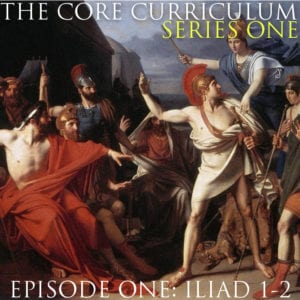
Controversially, Erskine argued that such masterpieces of Western literature should be approached directly, with teaching focused not on understanding historical, biographical, or other context, but on the questions raised by the texts themselves. He assumed that The Iliad and The Aeneid were as relevant in the 20th century as when first written, for “if a book no longer reflects our life, it will cease to be generally read, no matter what its importance for antiquarian purposes.” Their meaning was changeable, for the “great books are those which are capable of reinterpretation, which surprise us by remaining true even when our point of view changes.” Yet they remained “immortal things,” for they addressed “something constant in human nature… facts of life which do not depend upon fashions for their existence, nor upon philosophy for their importance.”
One of the young scholars who taught General Honors with Erskine was Mortimer Adler, who went on to teach a Great Books seminar at the University of Chicago (which continues to feature Greek writers like Homer, Sophocles, Plato, Herodotus, et al.) and then edit the Great Books of the Western World series for Encyclopedia Brittanica. While criticized by members of what the late Harold Bloom called the “School of Resentment,” that canon has had remarkable staying power. According to the Open Syllabus Project, Plato, Aristotle, Sophocles, and Homer remain among the thirty most-assigned authors at colleges and universities around the world.
In part, that’s because many colleges and universities continue to teach “Western civ” courses, and some even host Great Books programs. The latter model is especially popular on Christian college campuses, with Baylor, Biola, Eastern, Fordham, Mercer, Notre Dame, and Pepperdine among the many CCCU and Catholic institutions offering Great Books options (often in honors colleges). And many of their students spent their K-12 education in classical schools that are increasingly popular with conservative Christians.
All undergraduates at my Christian college have to choose between our Great Books sequence and the Christianity and Western Culture course that I teach and coordinate. I often wrestle with that role, but in the end, I tend to agree with Philip that “the West” is both a social construct and well worth teaching. Emerging from particular contexts, what we call Western civilization both embodies the biases and privileges of those in power and helps us to recognize, protest, and correct for them. Bethel’s version of “Western civ” starts with another of the most-assigned texts in the contemporary canon: Martin Luther King, Jr.’s “Letter from a Birmingham Jail,” which twice appeals to Socrates in order to critique the Jim Crow version of the West. This fall at the University of Southern California, classics professor Brandon Bourgeois is teaching The Iliad as hip-hop performance, in part because he thinks that ancient Greek and Roman literature can be “used as a tool for emancipation.”
Though no more immortal or moral than Riordan’s gods, perhaps “Western civilization” can still help students from New York to Los Angeles to ask enduring questions about what T.S. Eliot called “permanent things.”


